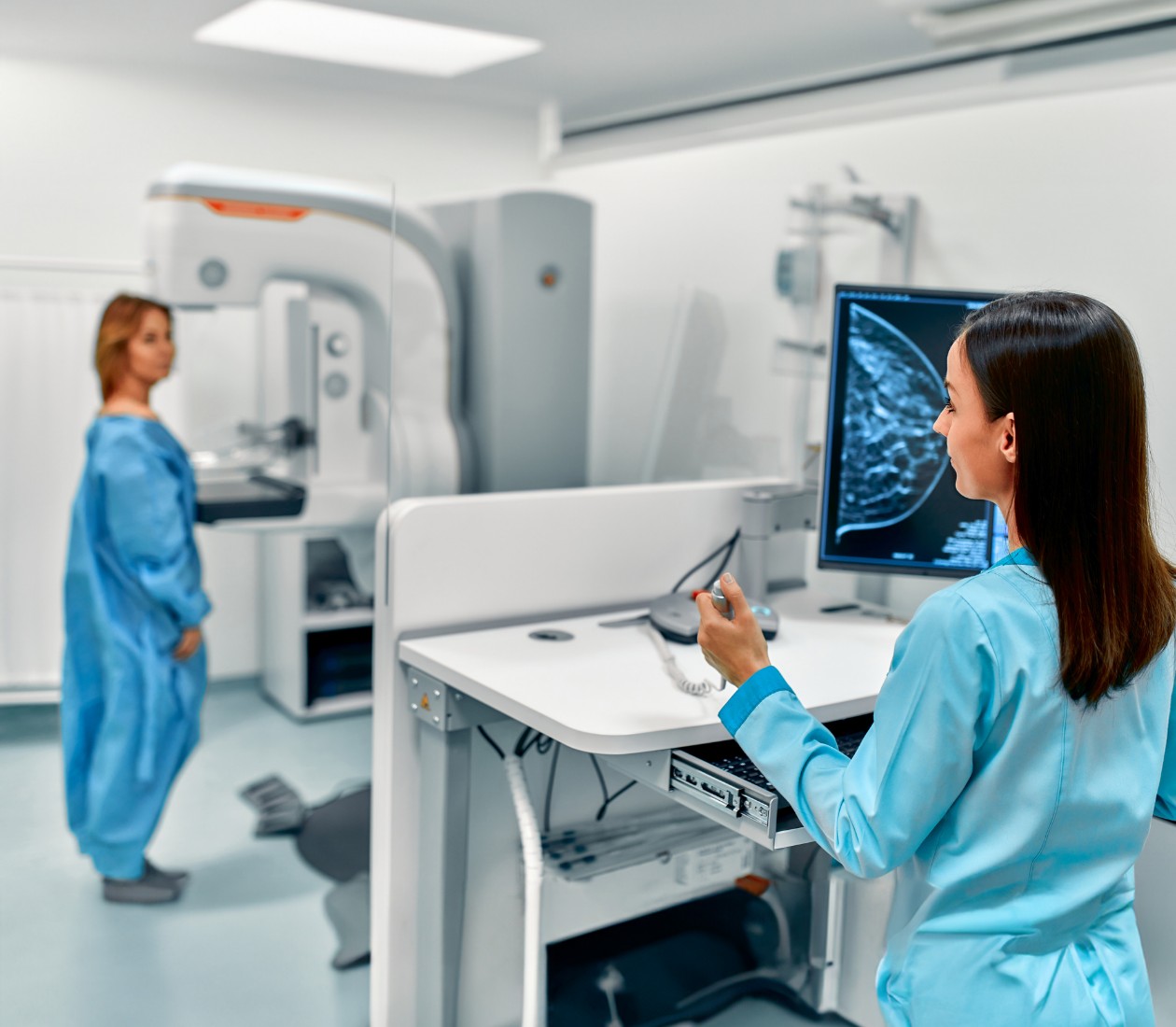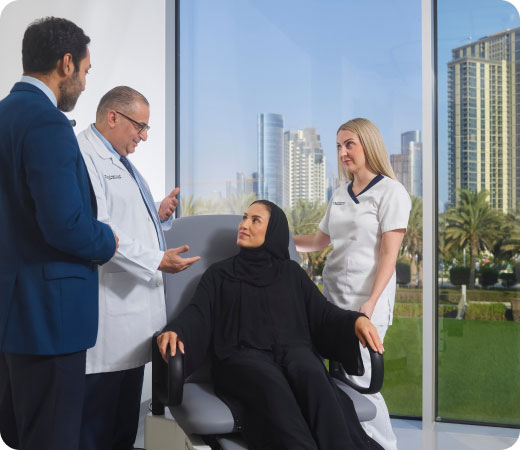.jpg?h=539&w=1920&la=en&hash=A93884941D34F2A1063873D225AB1F7B)
The Breast Health & Cancer Program at Cleveland Clinic Abu Dhabi provides access to a full range of breast health services, including screening, imaging, diagnostics, genetic testing, medical oncology, breast surgery and reconstruction, all in one place.
Our clinic features a dedicated Breast Imaging Suite, with our all-female multidisciplinary team performing screening, investigative and advanced diagnostic techniques such as image guided biopsy, not available anywhere else in Abu Dhabi, in a completely private and compassionate environment. We are one of only a handful of centers providing the latest AI-powered 3D mammography (tomosynthesis), breast MRI/fast MRI and advanced breast density analysis, which allow for better detection of tumors and reduces the likelihood of false positives.
Our multidisciplinary team of specialists provides cutting-edge breast cancer treatment options, addressing the most complex of cases, including targeted therapies, immunotherapy and radiation therapy. Surgical treatment options include innovative techniques including robotic mastectomy, a minimally invasive approach offering smaller incision, improved cosmetic results and faster recovery. Reconstruction is an important part of the journey, and we continue to care for patients long after their mastectomy, performing additional procedures when needed.

Our Breast Health & Cancer Program multidisciplinary team works together to provide compassionate, comprehensive breast care, close to home. We offer the latest screening, diagnosis, and treatment for women with both breast cancer and benign (non-cancerous) breast diseases, including novel targeted therapies and intraoperative radiation therapy. We also work collaboratively to promote breast health awareness and breast cancer prevention.
Our multidisciplinary approach brings together a team of experts to provide coordinated and exceptional patient care for those diagnosed with breast cancer. The team meets regularly as a multidisciplinary tumor board to discuss each patient and ensure the best treatment options are considered for each individual.
For women requiring surgery after breast cancer, we work closely with the Plastic Surgery Program at Cleveland Clinic Abu Dhabi’s Integrated Surgical Institute. The program offers women who have surgery as part of their breast cancer treatment reconstructive surgery to recreate and rebuild the missing breast with prosthetic reconstructions (implants) or autologous reconstruction (using their own tissue).
We are one of the few centers in the UAE that provide the DIEP flap procedure, the gold standard treatment for breast reconstruction. We are also one of only a small number of centers globally to offer prophylactic lymphovenous anastomosis within our Lymphedema Service, a cutting-edge procedure which can prevent post-surgery swelling and fluid build-up in the upper extremities – a condition that affects up to 20% of breast cancer patients.

The cells in our body follow a natural process of dividing to reproduce when new cells are needed. If cells in the breast tissue, glands or ducts start to reproduce out of control, this can form a tumor and result in breast cancer. If these cells are normal, the tumor is called benign (non-cancerous), however, if the cells are abnormal, the tumor is known as malignant (cancerous).
The Breast Health & Cancer Program treats a range of breast cancers and conditions, including:
Breast Cancer Reconstruction
Whatever the patient's age or relationship status we can always offer reconstruction to recreate the breast and improve overall self-image. Working with the Plastic Surgery Program at Cleveland Clinic Abu Dhabi’s Integrated Surgical Institute, we offer women who have surgery as part of their breast cancer treatment reconstructive surgery to recreate and rebuild the missing breast with prosthetic reconstructions (implants) or autologous reconstruction using the patient’s own tissue. Surgery can be done immediately at the time of mastectomy (complete removal of the breast) or delayed at any time after the patient finishes her cancer treatment. It is also possible to reconstruct breasts after partial removal of the breast (lumpectomy).
We offer prosthetic reconstruction with silicone implants, and we also offer more complex microsurgical reconstruction using the patient’s own tissue. The most common tissue that we use is the lower abdominal tissue, otherwise known as the DIEP flap. We are one of the few centers in the UAE that provide this gold standard treatment for breast reconstruction.
We also offer a Lymphedema Service, which provides prophylactic lymphovenous bypass at the time of axillary node removal. Currently only performed in a handful of centers worldwide, the cutting-edge procedure can prevent post-surgery swelling and fluid build-up in the upper extremities, which affects around 20% of all breast cancer patients. Performed by a specialized breast surgeon using micro instruments, the lymphatic vessel surgery is done at the time of mastectomy and clearing of axilla, reducing the risk of lymphedema occurrence to 5%. Additionally, reverse axillary mapping is offered to reduce the incidence of lymphedema.

Breast cancer is the most common cancer among women both globally and locally. Signs and symptoms of breast cancer may include:
While there is not a specific cause of breast cancer, there are a number of controllable and non-controllable risk factors which can affect the likeliness of developing it:
Risk factors you can control:
Risk factors you can’t control:
Women at high risk should have more regular screenings to detect any anomalies early.

Early diagnosis offers the best chance of successful treatment of breast cancer, so getting screened (having a mammography) is the first line of defense. Our diagnostic services include:
PET Scan: For breast cancer patients that have received a diagnosis (established). This scan helps doctors to see inside the body to better understand your condition and plan treatment. Specifically, for those with hormone receptor-positive breast cancer, there's a special type of PET scan available. It uses a radiolabeled form of estrogen called estradiol, which can provide more detailed information about your cancer and help tailor your treatment plan for better results.
We offer a range of options to treat breast cancer, and our breast care specialists will help to determine the best treatment plan based on type of breast cancer, size and location of the tumor, disease stage, lab test results, and the individual’s overall health.
Treatments can include:
Breast cancer treatments are local or systemic, and patients may have just one form of treatment or a combination. Local treatments include surgery and radiation, which are used to remove, destroy, or control the cancer cells in a specific area. Systemic treatments include chemotherapy, targeted therapy, immunotherapy, and hormone therapy, which are used to destroy or control cancer cells throughout the body.

Early diagnosis offers the best chance of successful treatment of breast cancer, so routine breast cancer screening (having a mammography) is the first line of defense.
Screening helps to identify cancer before any symptoms appear, meaning that cancer can be detected at an early stage. When breast cancer is found early, it is easier to treat, and survival rates increase.
Screening helps to identify cancer before any symptoms appear, meaning that cancer can be detected at an early stage. When breast cancer is found early, it is easier to treat, and survival rates increase.
One Step at a Time, Together.
Screening takes minutes to perform, but really could save your life.
Learn More

Our Breast Health & Cancer Program doctors have extensive expertise in the field of breast health and oncology. Caregivers involved in patient care for this program includes:

Speak with our Contact Center for assistance
Request an Appointment 800 8 2223 International Patients